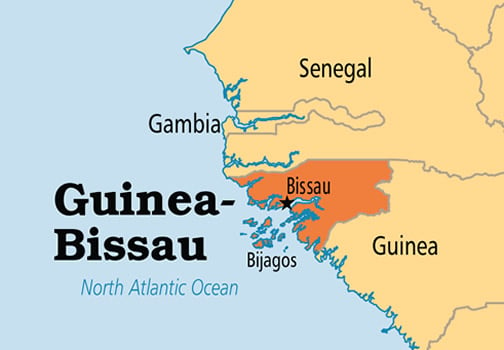677
Lizzy Chirkpi
Guinea-Bissau entered a new phase of political turmoil on Wednesday after senior military officers announced that they had taken control of the state, suspended the electoral process, and sealed the country’s borders moves that unfolded amid heavy gunfire and deepening confusion in the capital, Bissau.
A group of officers appearing on national television identified themselves as the “High Military Command for the Restoration of Order.” Reading from a prepared statement, they declared that the armed forces had assumed “total control” of the government and that all elections were suspended “until further notice.” They also ordered the immediate closure of borders and imposed a night-time curfew.
The intervention came just one day before final presidential vote results were expected from Sunday’s tense election, in which incumbent President Umaro Sissoco Embaló faced challenger Fernando Dias. Political tensions had already been escalating, with civil society groups questioning the legitimacy of the polls after the main opposition PAIGC party was barred from fielding its preferred candidate.
Throughout Wednesday morning and early afternoon, residents reported sustained gunfire around key government installations, including the election commission headquarters, the presidential palace, and the Ministry of Interior. Soldiers in full combat gear blocked access roads leading toward strategic sites around the capital. By midday, journalists from AFP reported that military units had taken firm control of central government zones, signaling the momentum of the unfolding coup.
Speaking by phone to France24, President Embaló said, “I have been deposed,” adding that he was being held at the general staff headquarters. Reports indicated he was under arrest alongside Domingos Simões Pereira, leader of the PAIGC.
According to one reporter, Brigadier General Denis N’Canha, commander of the presidential guard, was leading the coup, an especially striking development given that his unit is responsible for protecting the president. “The man supposed to protect the president himself has put the president under arrest,” one correspondent noted.
Witnesses and journalists also reported attempts by the military to disrupt internet access and enforce strict curfew measures as the takeover unfolded.
This week’s vote had already been fraught with tension and mutual accusations. Both Embaló and Dias had prematurely declared victory before official results were released.
Embaló’s spokesperson, Oscar Barbosa, asserted confidently on Tuesday: “There won’t be a second round. The president will have a second mandate.”
Dias posted his own message on social media, saying, “This election has been won. It has been won in the first round.”
The dueling claims heightened fears of a political showdown. Many observers described a “predictable political impasse,” given Guinea-Bissau’s long history of election disputes, military interference, and failed transitions.
The sudden military intervention prompted calls for restraint from abroad. The Portuguese government urged all actors to avoid “any act of institutional or civic violence” and to allow the electoral process to reach its conclusion peacefully.
Guinea-Bissau has suffered a string of coups and attempted coups since gaining independence from Portugal in 1974. The last presidential election in 2019 descended into months of uncertainty after both Embaló and Simões Pereira claimed victory, an echo of the current crisis.
With the military now in open control and no clarity on the fate of the election or the constitutional government, the nation finds itself bracing for what many fear could become another prolonged period of instability.



